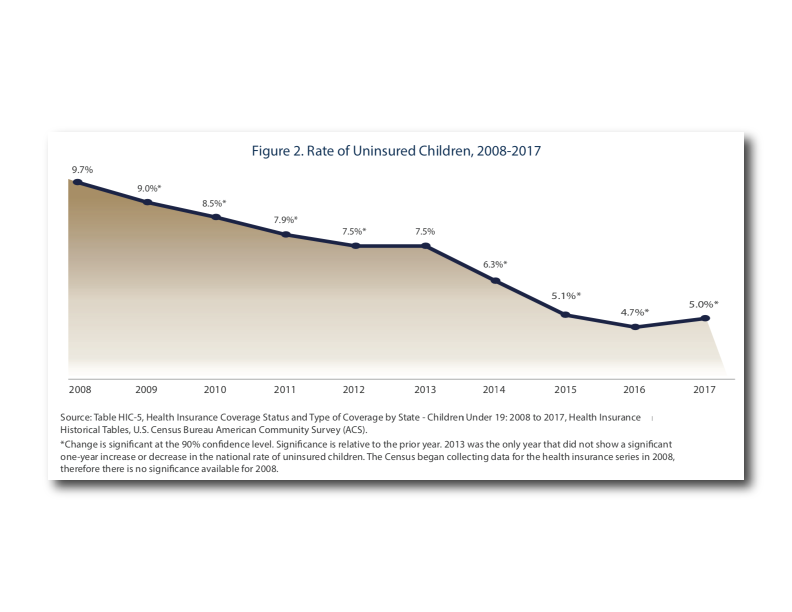Research & Reports
-
Nation’s Progress on Children’s Health Coverage Reverses Course
Introduction For the first time since comparable data was first collected in 2008, the nation’s steady progress in reducing the number of children without health insurance reversed course. The number of uninsured children under age 19 nationwide increased by an estimated 276,000 to about 3.9 million (3,925,000) in 2017, according to newly-available data from the…
-
How Proposed Changes to Public Charge Would Impact Children in Immigrant Communities
Editor’s Note, 10/15/19: Several federal courts have issued nationwide injunctions blocking implementation of the proposed changes to the public charge rule. We will update any further developments. Introduction The Department of Homeland Security (DHS) issued a proposed regulation that would radically change U.S. immigration policy. The changes would ripple through nearly every aspect of the…
-
Health Insurance Coverage in Small Towns and Rural America: The Role of Medicaid Expansion
Introduction Medicaid has been a key factor in lowering the percentage of Americans who lack health insurance. Nationally, the uninsured rate for all Americans under the age of 65 (adults and children) fell dramatically between 2010 and 2016 from 18.2 percent to 10.4 percent, rising slightly to 10.7 percent in 2017. Expansion of Medicaid coverage…
-
Summary of Mississippi’s Revised Section 1115 Medicaid Waiver Proposal
Overview: A revised version of Mississippi’s Section 1115 waiver proposal, which seeks to condition Medicaid eligibility on compliance with a work/community engagement requirement for very low-income parents/caregivers, has been re-opened by the federal government for public comment. Comments on the waiver, known as the “Mississippi Workforce Training Initiative,” are due by August 18, 2018. The…
-
New Waiver Proposal for Oklahoma Medicaid Beneficiaries Would Harm Low-Income Families With Children
Introduction Oklahoma is planning to ask federal permission to impose a work requirement on very low-income parents and caregivers receiving health coverage through Medicaid. Under the proposal, these beneficiaries would have to document that they are working at least 20 hours a week or participating in job-training or volunteer activities in order to maintain their…
-
Medicaid and CHIP Provide Health Coverage for Many School-Age Children, Yet Gaps Remain
Introduction Children need health coverage to help them stay healthy and ready to learn in the classroom. Medicaid and the Children’s Health Insurance Program (CHIP), the primary public health coverage sources for children, have worked together in recent decades to bring the rate of uninsured children to historic lows. In 2016, only 4.5 percent of…
-
State Medicaid and CHIP Snapshots, 2018
The Georgetown University Center for Children and Families (CCF) and the American Academy of Pediatrics (AAP) created factsheets underscoring the importance of Medicaid in providing coverage for children in all 51 states (including the District of Columbia). Sources are available here. Previous snapshots can be found here.
-
Low-Income Families with Children Will Be Harmed by South Carolina’s Proposed Medicaid Work Requirement
Introduction South Carolina officials are proposing that parents and caregivers who qualify for Medicaid prove they are working at least 80 hours a month or participating in job-training or volunteer activities before receiving health coverage. The state will have to seek a Section 1115 demonstration waiver from the federal government to implement this plan. If…
-
What Does New Federal CHIP Law Mean for Children’s Health Insurance in Florida?
Overview After much delay, Congress recently passed two extensions of the Children’s Health Insurance Program (CHIP) which funds coverage for approximately 345,000 children in Florida. CHIP covers children in families with incomes over the poverty line that are not eligible for Medicaid but can’t afford private insurance. CHIP is a federal-state matching program and states…
-
Snapshot of Children’s Coverage by Race and Ethnicity
Medicaid and the Children’s Health Insurance Program (CHIP) are primary sources of health coverage for children. These programs are particularly important to children of color, who are disproportionately represented among beneficiaries because they are more likely to be economically disadvantaged. Read and download our snapshots Snapshot of Children with Medicaid by Race and Ethnicity, 2018…
-
Protecting and Promoting Medicaid’s Guaranteed Benefits for Children: Iowa EPSDT and Managed Care
Introduction With support from the Georgetown University Center for Children and Families under a Robert Wood Johnson Foundation grant, the Child and Family Policy Center (CFPC, also referred to as the Center) engaged in activities in 2017 to protect and strengthen Medicaid’s critical pediatric benefit in the context of Iowa’s managed care rollout. CFPC welcomed…
-
Protecting and Promoting Medicaid’s Guaranteed Benefits for Children: Illinois EPSDT and Managed Care
Introduction In 2017, the Sargent Shriver National Center on Law Poverty and Everthrive Illinois engaged in activities to protect and strengthen Medicaid’s comprehensive and preventive pediatric benefits as more children were enrolled into Managed Care Plans (MCOs). This work was supported by the Georgetown University Center for Children and Families through a grant from the…
-
Assessing Florida’s Medicaid Reform
Over the past decade, Georgetown University researchers have studied Florida’s Medicaid program with funding from the Jessie Ball DuPont Fund, the Winter Park Health Foundation and other Florida-based funding partners. Our studies have looked into Florida’s Medicaid pilot waiver launched in 2006, the current Medicaid waiver launched in 2013 and the debate in Florida over…
-
Proposed Medicaid Work Requirement: Impact on Mississippi’s Low-Income Families
(Updated August 3, 2018) Introduction Mississippi has joined a handful of states seeking federal permission to require parents and caregivers who qualify for Medicaid to prove they are working at least 20 hours a week or participating in an approved work activity before receiving health coverage. Called the “Mississippi Workforce Training Initiative,” the application for…
-
Medicaid and CHIP Eligibility, Enrollment, Renewal, and Cost Sharing Policies as of January 2018: Findings from a 50-State Survey
Executive Summary This 16th annual 50-state survey provides data on Medicaid and the Children’s Health Insurance Program (CHIP) eligibility, enrollment, renewal and cost sharing policies as of January 2018. It takes stock of how the programs have evolved as the fifth year of implementation of the Affordable Care Act (ACA) begins, discusses policy changes made…
-
The Impact of Alabama’s Proposed Medicaid Work Requirement on Low-Income Families with Children
(Updated August 23, 2018) What is Alabama proposing to do? Alabama is seeking federal permission through a Section 1115 Medicaid demonstration waiver to require parents and caregivers who rely on Medicaid to work 20 to 35 hours a week, prove they are looking or training for a job or do community service before receiving Medicaid.…
-
Proposed Medicaid Work Requirement: Impact on Alabama’s Low-Income Families with Children
Alabama’s plan to impose a work requirement on parents receiving Medicaid could cost as many as 8,700 people their health coverage in the first year alone, affecting mainly mothers whose children also would feel the impact, according to a new analysis by the Georgetown University Center for Children and Families and Arise Citizens’ Policy Project.…
-
HEALTHY KIDS and ACCESS Acts: Summary of Key Provisions Impacting Children
Introduction On January 22, 2018, Congress passed a Continuing Resolution (CR) that included the Helping Ensure Access for Little Ones, Toddlers, and Hopeful Youth by Keeping Insurance Delivery Stable Act (HEALTHY KIDS Act) funding the Children’s Health Insurance Program (CHIP) for six years. Just over two weeks later, on February 8, 2018, Congress passed another…
-
Developmental Screenings for Young Children in Medicaid and the Children’s Health Insurance Program
Introduction As our nation reaches historic levels of health coverage for children, there is increased interest in further ensuring access to the care needed for children to reach their full potential. Years of research have confirmed the critical importance of the earliest years of a child’s development. The first months and years of a child’s…




















